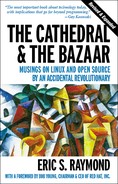Foreword
Freedom is not an abstract concept in business.
The success of any industry is almost directly related to the degree of freedom the suppliers and the customers of that industry enjoy. Just compare the innovation in the U.S. telephone business since AT&T lost its monopoly control over American consumers with the previously slow pace of innovation when those customers had no freedom to choose.
The world’s best example of the benefits of freedom in business is a comparison of the computer hardware business and the computer software business. In computer hardware, where freedom reigns for both suppliers and consumers alike on a global scale, the industry generates the fastest innovation in product and customer value the world has ever seen. In the computer software industry, on the other hand, change is measured in decades. The office suite, the 1980s killer application, wasn’t challenged until the 1990s with the introduction of the web browser and server.
Open-source software brings to the computer software industry even greater freedom than the hardware manufacturers and consumers have enjoyed.
Computer languages are called languages because they are just that. They enable the educated members of our society (in this case, programmers) to build and communicate ideas that benefit the other members of our society, including other programmers. Legally restricting access to knowledge of the infrastructure that our society increasingly relies on (via the proprietary binary-only software licenses our industry historically has used) results in less freedom and slower innovation.
Open source represents some revolutionary concepts being thrown at an industry that thought it had all of its fundamental structures worked out. It gives customers control over the technologies they use, instead of enabling the vendors to control their customers through restricting access to the code behind the technologies. Supplying open-source tools to the market will require new business models. But by delivering unique benefits to the market, those companies that develop the business models will be very successful competing with companies that attempt to retain control over their customers.
There have always been two things that would be required if open-source software was to materially change the world: one was for open-source software to become widely used and the other was that the benefits this software development model supplied to its users had to be communicated and understood.
This is Eric Raymond’s great contribution to the success of the open-source software revolution, to the adoption of Linux-based operating systems, and to the success of open-source users and the companies that supply them. Eric’s ability to explain clearly, effectively, and accurately the benefits of this revolutionary software development model has been central to the success of this revolution.
Bob Young, Chairman and CEO, Red Hat, Inc.
